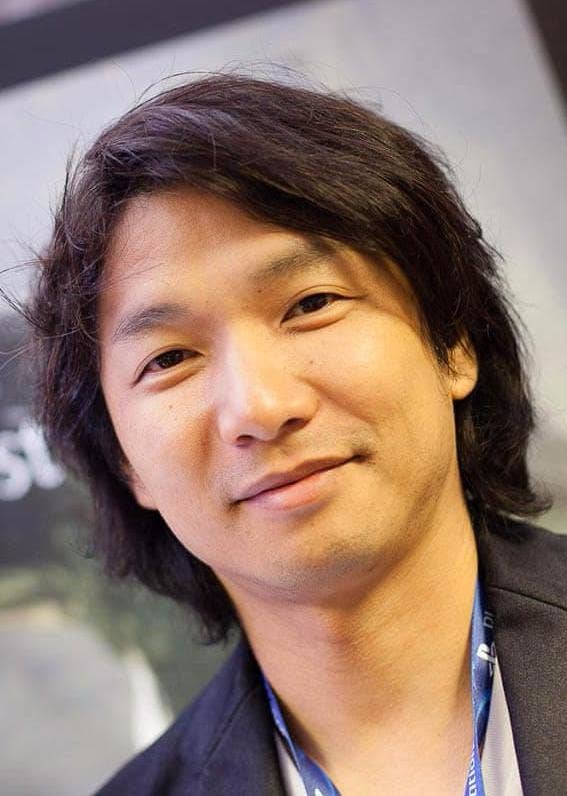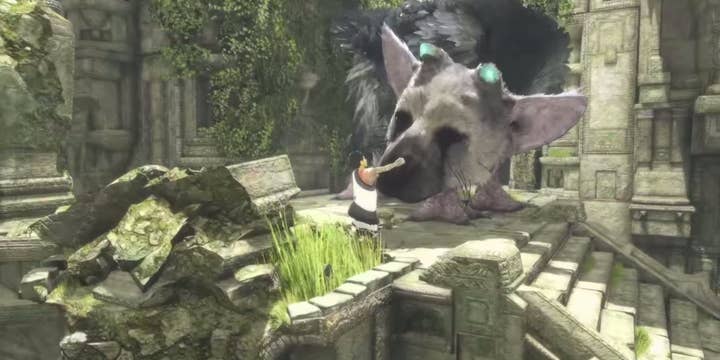Fumito Ueda: “For me, it's not important to tell the details of the story”
The Last Guardian developer shares his design process with Massive MD David Polfeldt and attendees at Nordic Game Conference
Fumito Ueda explained why he is "intentionally mysterious" with the narrative in his games, and hinted that his next project might return to a more open world.
Ueda was the focus of this morning's opening session at Nordic Game Conference, structured as a fireside chat with David Polfeldt, the managing director of Tom Clancy's The Division studio Massive Entertainment.
Opening with anecdotes from his studies into fine art, Ueda came to realise that it wasn't art he enjoyed by entertainment. After dabbling in animation with his Amiga, he became a CG artist at Japanese developer WARP, where the idea for his first major hit began to form. Frustrated with his employers, he left to pursue this project on his own.

"At the time I quit from the company I was working at, I already had the idea for Ico," he told attendees. "The name, too. And I had an image of a tall girl pulled [along] by a boy just holding her hand. But I wasn't sure whether it would be a movie or a game."
While he was able to work on Ico for a time, he was compelled to find employment again as his savings started to run out. Fortunately, Sony Computer Entertainment was hiring for a CG artist.
"I applied for that, but I had one condition: that I couldn't work full time, because I needed time for myself," he said. "Sony asked what I was doing in my own time, so I started to talk about Ico. They understood the idea and then suggested I work on that Sony."
Many of Ueda's projects start out with just a mental image. With Ico, he said it was the idea of a boy leading a tall girl by the hand, while for The Last Guardian it was a vision of Trico sitting on a high, narrow ledge with a young boy hanging on below him. Polfeldt asked if Ueda knows what the story will be when he has that image in mind.
"The ending of Ico would change during the creation and development phase, due to technical limitations. I needed to priorities other things"
"I had just a rough idea," Ueda admitted. "For Ico, I knew the boy and girl knew each other but at some point she had lost her memories. So at the end of the game, does she remember the boy? But that was not the actual ending. That was the ending image I had at the beginning of the production. The ending would change during the creation and development phase, due to the technical limitations and resource management. I needed to priorities other things."
Polfeldt commented that he views the vague method of storytelling in Ueda's games as something akin to poetry, but wondered if that was the developer's intention. Was Ueda "intentionally mysterious" or did he actually want people to understand the way he viewed the story?
"For me, it's not important to tell the details of the story," he answered. "In Japan, there is a poet expression called a haiku [where] you don't explain some things in detail and let the receivers understand or use their imagination with what is presented.
"That lets the receivers make their own story from their imagination, and I think this is also a good style of expression for video games - at this moment. In the future, someone may discover there's another way to do narrative and tell stories through gaming, but at this moment I think this is a great way to tell stories."
Polfeldt replied: "It certainly works well for me. In your games there are a lot of question marks, so they live with me longer. It makes me think about them in a different way."
Ueda said: "That's good to hear because I intentionally do that. In some movies the story is so complete, there isn't any ending you can guess because it's already done. That type of movie doesn't leave a long-lasting impression."

The acclaimed designer takes a similar approach to studio management, laughing off Polfeldt's playful suggestion that he might be a "crazy dictator, running around telling people what to do".
"We talked about [stories] that don't quite tell you everything - my direction is the same"
"We talked about [stories] that don't quite tell you everything - my direction is the same," he said. "When I'm asked for direction, I say 'yeah, something like this'. I don't give detailed points, so people are kinda angry when they come back to me and ask 'why can't you explain more?'."
Polfeldt observed that the structure of Ueda's games seem to alternate. Ico was a linear experience, while Shadow of the Colossus featured a more open world. For The Last Guardian, Ueda returned to a more restricted environment - and the designer explained why.
"I created the more open world of Shadow because Ico was an adventure game set in such a small space - and I spent four years in that closed space," he said. "So I wanted to go out into something more open.
"I cannot talk about the details [of my next project] but... Shadow came out of the experience with Ico, [going] from a closed world to open world. When I completed Shadow, there was a moment where I wondered if I wanted to go around an open world again, and maybe I should go back to a more closed space, spending a more intimate time with something in that space. That became the starting point for The Last Guardian.
"Now I've completed The Last Guardian and spent so many years in that game, maybe I may go back to the Shadow-type environment."
Elsewhere in the conversation, Ueda discussed how he draws some of his inspiration from music, which has become instrumental in motivating him as he creates.
"I listen [to music] a lot while I'm working," he said. "What I'm creating is a fantasy world, but personally I'm not very interested or fond of fantasy. But I need to dive into the world I want to create, feel that world, and be inside it. Music helps me, so I listen to a lot of soundtracks [for fantasy films].
"As a person, I'm very practical. But I really need to believe the world I'm creating exists, so I need to make myself believe by getting inspiration from music or books that [centre around] fantasy worlds. A lot of people believe that I'm such a fantasy person and living in that fantasy world all the time, but there's a huge gap between people's perception of myself and me as a person."
Ueda dispelled the notion that he's a "crazy millionaire", as Polfeldt put it, living in a mansion with ten Ferraris. Instead, he says he lives in a normal house and has actually bought a Volvo.
When asked if he could have any job in the world, Ueda said he would still keep his as he enjoys the creative freedoms and possibilities afforded by games that can't be found in other forms of entertainment. Batting the question back to Polfeldt, the Massive boss said he'd like to be a writer because "believe it or not, I find it quite stressful working with a lot of people and I'd like to have a job where I'm alone."
GamesIndustry.biz is official media partner for Nordic Game Conference 2017.
